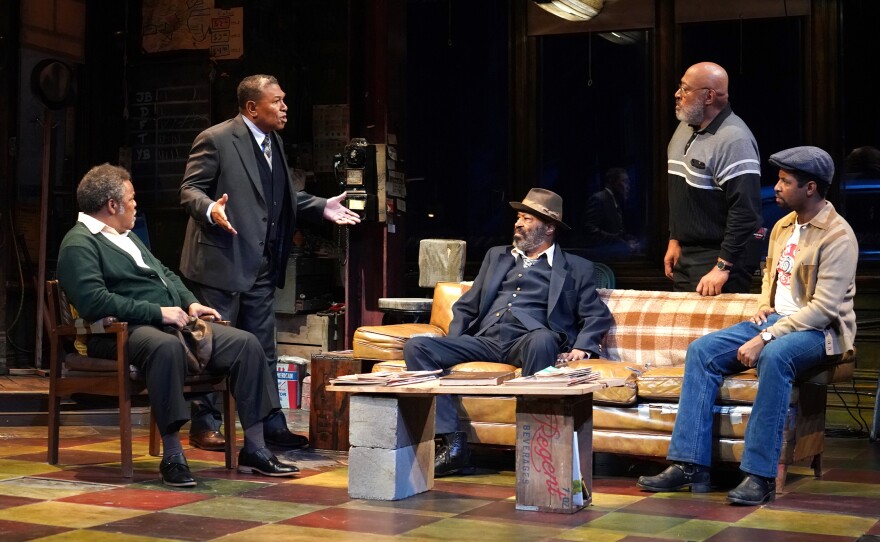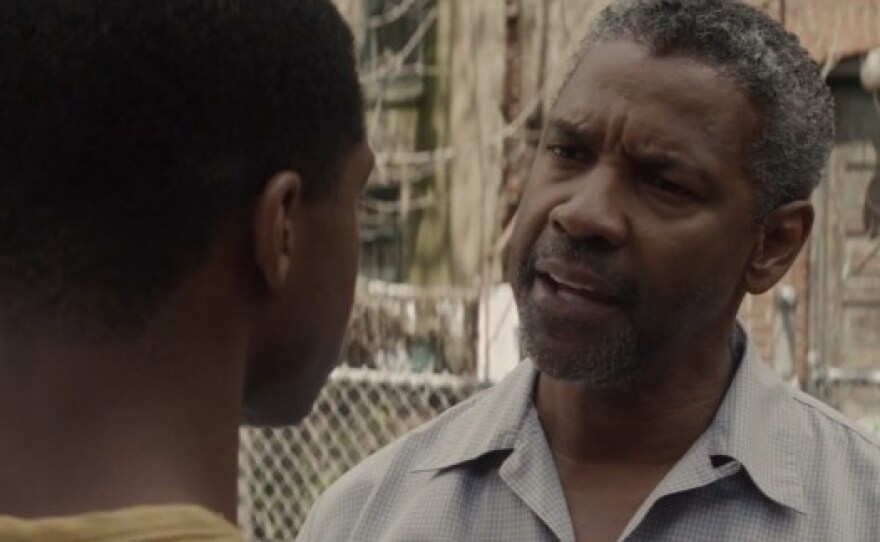Companion viewing
"The Piano Lesson" (1995)
"Fences" (2016)
"Ma Rainey's Black Bottom" (2020)
"Jitney" was the first play August Wilson wrote, but the last to make it to Broadway. It now comes to the Old Globe stage with a director and cast that are part of Wilson’s extended theater family.
Wilson’s plays always make director Ruben Santiago-Hudson think of the same thing.
"Home. I'm home," he said. "I know these people intimately. I know the way they smell."
That sense of home and family are also key for actor Keith Randolph Smith.
"It's like having Thanksgiving dinner and we invite all these people over and we make an offering of dinner for them. And that's the play," Smith said.
'Jitney' and Wilson's style
Wilson chronicled African American life in the 20th century in a cycle of 10 plays, each focusing on a different decade. “Jitney” is set very specifically in the Hill District of Pittsburgh in 1977 and looks to a group of unlicensed cab drivers.
"When people come see the play, they always remark that, 'Oh, that character reminds me of my uncle. That character reminds me of that cousin.' And I've heard this from people of many different nationalities, many different ages, many different genders. And so I know there's something universal in the specificity of his writing and it's beautiful to witness and behold," Smith explained.
Smith first acted in "Jitney" in 1998 and played the young son, Booster. Now he has aged into the part of the Doub and he appreciates Wilson’s writing even more.
"What he did was he showed working-class people," Smith said. "He didn’t show them as saints. He showed them all the complexity and all of their dimensions. It's not all the time that I get to play a three-dimensional character but here you play a person who has wants, likes, desires, challenges and just a full human being. And that's one of his specialties. What he does is show rich characters in all of their depth and especially working-class folks."
Steven Anthony Jones plays Becker, the owner of the jitney station, which is about to be shut down for good.
"The play occurs against a backdrop of urban renewal and that's cause for a lot of angst," Jones said. "By examining the most mundane things he found things that were profound."
Santiago-Hudson, who’s directing the touring production of “Jitney,” wants to convey both the mundane and the profound in the play. He says Wilson is a great storyteller but that’s not where his true brilliance lies.
"The brilliance is how you put that all together in a dynamic platform and create conflict, deceit, love, jealousy, disappointment. How do you put all those things in and reveal them in the context of just storytelling," Santiago Hudson said.

Wilson achieves that in part by having plays that are not plot-driven, but rather character and language-driven.
"It’s so beautiful, so poetic," Jones said. "Very often I find myself afterwards feeling as though I had been riding, floating along in this sea of language that carries me up and down. And sometimes it's stormy and turbulent and other times it's just smooth and the sun is shining and it's filled with such beauty. But the other thing about his writing is that he achieves an emotional honesty that is stunning."
Santiago-Hudson respects Wilson’s written word and the world it conveys.
"The way I direct August Wilson, I'm not trying to explain my people to you," Santiago-Hudson said. "I want you to experience them the same way I experience 'Fiddler on the Roof.' The same way I experienced David Henry Hwang's 'Kung Fu,' the same way I experience any other culture. I just want to sit there and be inundated by something that I really don't know every day externally, and internally, something I know every day. Relationships."
Wilson’s plays are not just about the relationships you see on stage but also about the sense of community and family his plays create for everyone both in the plays and for the audience who come to sit at Wilson’s table and partake in the sustenance he provides.

Wilson on film
Since Santiago-Hudson has just turned Wilson's play "Ma Rainey's Black Bottom" into a film script that will be released later this year, I took the opportunity to ask about why so few film versions of Wilson's plays exist. He explained that the plays are written for the ear and for the stage and truly need to be translated to the medium of film.
"It's very difficult to adapt," Santiago-Hudson said. "Because for the stage people come to listen. In film, people come to watch. I mean the greater part of why you're there. Because if you come to Shakespeare, you come to listen. If you come to Chekov, you come to listen. And you come to listen to August Wilson. Motion pictures tell a story with pictures more than words. So my challenge when I wrote 'Ma Rainey' the movie was how do I save the arias, as many as I can. What are the most important arias? And then how do I make some arias visual?"
The film is being directed by George C. Wolfe and stars Viola Davis and Chadwick Boseman. It is being produced by Denzel Washington who in 2016 directed, starred in and produced a film version of Wilson's "Fences."
Santiago-Hudson elaborated on the differences between film and theater: "When you come into a room with a lot of seats that people sit in, strangers sitting in a dark room, the lights come on and there's a storyteller there, you want to hear the story. It's different when you go into a dark room and the lights come up on a big screen. You want to see what's on that screen. In theater, we want to see too, but not a whole lot of visually impaired people, blind people that say 'I want to spend my afternoon in a movie,' I mean they do but they'll quickly say I'm going to hear a play because it's about the language, the wordsmiths who can drop the language and then who can speak it. Same with August and Shakespeare, they're very similar because they both have melody."
"The film version of "Ma Rainey's Black Bottom" is scheduled for release this year. "Jitney" continues at the Globe through Feb. 23.








